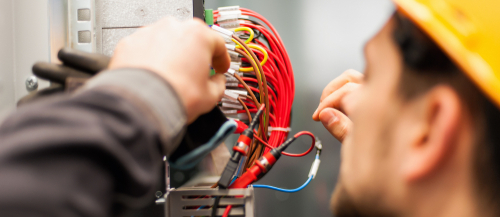Electricity has become a vital part of the way we live our lives in the 21st century. Think about it, one of the foremost things you do when you wake up includes reaching for an electrical switch of some sort…and that’s just the start. Our entire lifestyle is dominated by electricity and electrical appliances.
This reliance on the power of electricity means that electricians are always wanted and in high demand too.
After all, people will always call upon skilled workers with the right knowledge and experience to ensure that something so important continues to run smoothly and without any hiccups. Being an electrician is one of the foremost trades in that sense and a lucrative occupation, all things considered.
However, not many women tend to pursue a career in this area.
However, this trend is slowly changing, as the following video explains – At NEIT we help and encourage students to follow their chosen career path, even if it isn’t seen as conventional. Request information to know more. START YOUR ELECTRICAL TECHNOLOGY CAREER Earn your degree in Electrical Technology from NEIT and begin your new career path today! ASSOCIATE'S DEGREE BACHELOR'S DEGREE While it is great to see students like Nicole (video above) looking to pursue an education program after passing out of high school that will enable her to become a professional in her chosen career, not everyone perceives the job of an electrician as a girl or female-oriented one. Here are some of the reasons why: The primary step in the path to becoming an electrician is to get your education. You can either enroll in an Associate Degree in Electrical Technology program, which can be completed in a one-and-a-half-year time period or a Bachelor’s Degree in Electrical Technology, which takes twice the amount of time to complete. Alternatively, you could also seek out an apprenticeship. The apprenticeship is a four-year or five-year on-the-job training program that puts you straight in the industry as an electrician’s assistant. As an apprentice, the learning is less holistic but more field-oriented, with only a small portion of your education taking place in a school or classroom setting. That said, the time frame required to complete an apprenticeship program is longer than a degree course. The requirements for new female electrician apprenticeships are as follows – You may find that the requirements for an apprentice mentioned here may change from state to state. Whether you are going for formal education from a school or for an apprenticeship program instead, you will still have to put many hours of work in and get started at the bottom of the ladder. Female electricians’ jobs, much like those of their male counterparts, are interesting, fun, and very practical in nature. The tasks performed by specific workers will differ based on the specializations they serve, the things that the clients need, the nature of the tasks they have to perform, and the like. Here’s a quick rundown of what duties they perform – It isn’t difficult to find good work for women in this field. As we said earlier, the demand is there, so you should really be able to get work that you want and like without too much effort. If you enroll in a degree program, there are placement options available, and many other means by which institutes offer help to ensure something good comes your way in terms of employment opportunities. Take a look at the positions you would be eligible for as part of your career – In a time where women were seen as family-oriented and dedicated to their kids as their primary duty, Clarke made a name for herself as the first female electrician in US history. She also managed to get the distinction as the first woman to graduate MIT for this field. She later made and patented an early version of the graphing calculator, a brand-new innovation that could and did make life much easier for engineers of the era and is still in use today. She also won numerous awards, authored books, and papers on the field, and won one or two major awards in her time. Clarke paved the way and was able to blaze a trail that would make things better for women who wanted to enter this space and she was also able to share her knowledge and experience as an educator in her later life. When asked about her vocation, Edith Clarke had this to say, “There is no demand for women engineers, as such, as there are for women doctors; but there’s always a demand for anyone who can do a good piece of work.” We need to share the same attitude when the question of ‘can women be electricians?’ arises even today. If you truly love what you do, perceived gender roles shouldn’t stand in your way. Find out more about our admissions overview to enroll in a new program today. START YOUR ELECTRICAL TECHNOLOGY CAREER Earn your degree in Electrical Technology from NEIT and begin your new career path today! ASSOCIATE'S DEGREE BACHELOR'S DEGREE Here are some answers to the frequently asked questions regarding this vocation – According to a previous report, the electrical power line installers and repairers were the highest paid electricians with an average salary of $63,090 in 2015. In the coming years, electricians who can perform tasks like electronic systems repair, industrial component wiring, and solar photovoltaic installation are likely to have the best job opportunities. According to BLS, in 2019, the median electrician salary was $56,180 annually – well above the national median of $39,810. Also, electricians employed in the government sector earned more than any other industrial sector that employed electricians. You can read all about this in our detailed piece on the roles and responsibilities of this vocationStereotypes that Prevent Women from Becoming Electricians
Issues Faced by Women Electricians
How to Become an Apprentice
Responsibilities of a Female Electrician
Female Electrician Jobs and Career Progress
Edith Clarke – America’s First and Most Famous Female Electrician
FAQs
What are the highest paid electricians?
What does it mean to be an electrician?



